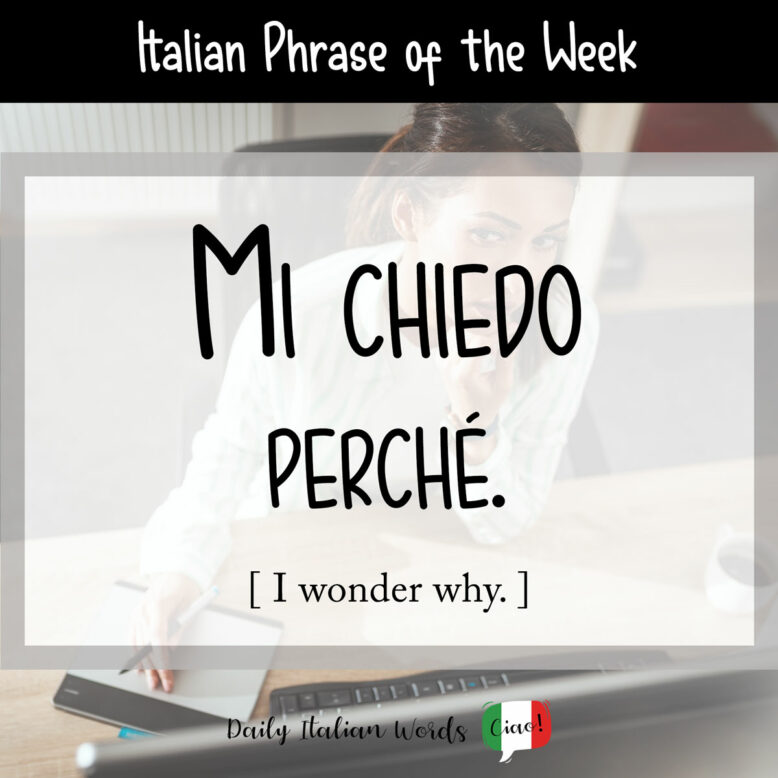Today’s Italian phrase will come in handy whenever you find yourself wondering about the mysteries of the universe!
Mi chiedo perché.
I wonder why.

As is customary, let’s break it down into its component parts:
Mi chiedo
The verb chiedere means to ask but if you drop the -e of its infinitive ending and add the pronoun si to the end, you get the reflexive verb chiedersi which means to wonder or to ask oneself.
Mi chiedo literally means I ask myself.
perché
An interrogative adverb meaning why. Not to be confused with the conjunction perché which means because.
If you wish to elaborate, you can add a noun clause after perché as in the following examples:
Mi chiedo perché loro sono sempre in ritardo.
I wonder why they are always late.
Mi chiedo perché la porta non è chiusa.
I wonder why the door isn’t closed.

Here is a table showing the conjugation in the present tense for the verb chiedersi, just in case you aren’t the only one doing the wondering!
io mi chiedo
I wonder
tu ti chiedi
you (informal) wonder
lui si chiede
he wonders
lei si chiede
she wonders
Lei si chiede
you (formal) wonder
noi ci chiediamo
we wonder
voi vi chiedete
you (plural) wonder
loro si chiedono
they wonder
In colloquial Italian, you may hear people accentuate the phrase with Ma (but) and/or Io (I) to express disapproval or disappointment, coupled with a different intonation. They may also pause between chiedo and perché, or double the perché as in the following example:
Ma io mi chiedo, perché loro sono sempre in ritardo!?
Ma perché, io mi chiedo, perché loro sono sempre in ritardo!?
But I do wonder, why are they always late!?
But why, I wonder, why are they always late!?
In the place of chiedersi, it is also possible to use the reflexive verb domandarsi. The meaning is the same but domandarsi is a little more formal.
Mi domando perché siamo qui.
I wonder why we’re here.
Yet another option you can use to express wonder besides chiedersi and domandarsi is the adverb chissà which means who knows.
- Chissà perché (loro) sono in ritardo. = Who knows why they are late.
- Chissà perché la porta non è chiusa. = Who knows why the door isn’t closed.
This article is also available in video format on our YouTube channel. The audio version can be found on Podbean, Google Podcast, Apple Podcast and Spotify.
Heather Broster is a graduate with honours in linguistics from the University of Western Ontario. She is an aspiring polyglot, proficient in English and Italian, as well as Japanese, Welsh, and French to varying degrees of fluency. Originally from Toronto, Heather has resided in various countries, notably Italy for a period of six years. Her primary focus lies in the fields of language acquisition, education, and bilingual instruction.


